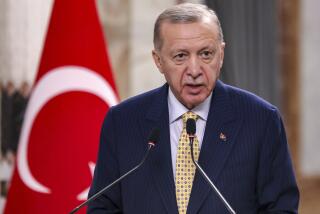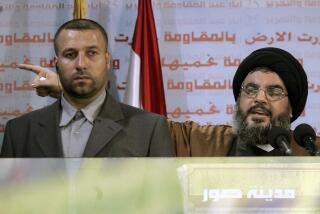Syrian opposition group names new president
BEIRUT — A deeply divided, U.S.-backed Syrian opposition group elected a new president Saturday as government troops continued their onslaught against rebel positions across the country, including in central Homs province and near Damascus, the capital.
At a meeting in Istanbul, the Syrian National Coalition’s ruling council elected Ahmad Assi Jarba, described in a coalition statement as a lawyer and former political prisoner. Jarba was arrested when the uprising against Syrian President Bashar Assad began in March 2011 and fled to neighboring Lebanon five months later, the coalition said.
The election follows months of wrangling that again exposed the deep rifts that have bedeviled the opposition and its foreign patrons. The coalition has been without a president since the former leader, Moaz Khatib, quit in April amid disagreements within the fractious exile assemblage.
The new president was named as the United States and other Western nations are considering providing arms to Syrian rebels. The coalition and its military wing are expected to play a key role in coordinating future deliveries of weapons and other supplies to fighters on the ground in Syria.
Jarba, a tribal leader from northern Hasaka province, is reported to be close to the government of Saudi Arabia. Runner-up for the presidency was a high-profile opposition leader, Mustafa Sabbagh, a businessman said to be the opposition point man for Qatar.
Saudi Arabia and Qatar have funneled vast amounts of cash, weapons and other supplies to the Syrian opposition in a murky operation carried out in conjunction with the United States and other allies committed to overthrowing Assad. But the two wealthy Gulf states have sometimes backed rival rebel factions, leading to tensions in the opposition camp.
It remained to be seen if Jarba’s election signaled an elevation of Saudi Arabia’s influence in the Syrian civil war and a diminution of Qatar’s role. Some Western diplomats have reportedly complained that Qatar has dispatched much of its Syrian aid to Islamist groups with an anti-Western agenda.
Hundreds of armed rebel factions are fighting inside Syria, many with their own logistics channels to suppliers in the Gulf and elsewhere. The exiled-based coalition has struggled to create a central command, so far with little success. Among the rebels fighting on the ground are some with ties to Al Qaeda, a fact that has alarmed U.S. policymakers trying to devise a coherent policy to deal with the Syrian crisis.
The divided nature of the exiled-based opposition has exasperated officials in Washington and elsewhere who have recognized the opposition coalition as the “legitimate representative” of the Syrian people. The coalition has also struggled to gain legitimacy with rebels and anti-government activists inside Syria, where many view the exile-based groups with suspicion.
The Syrian government insists that it is the sole legal representative of all Syrians and labels the coalition is an instrument of foreign aggression.
In an interview published last week in a Syrian newspaper, Assad said nations conspiring against Syria “have used up all their tools ... and they have nothing left except direct intervention” — which, he said, would not occur.
On the ground in Syria, government troops have regained considerable territory in recent weeks, including recapturing the strategic town of Qusair near the Lebanese border. On Saturday, Syrian authorities reported new military advances against rebels in the central city of Homs and in several Damascus suburbs, including the industrial district of Qaboun, northeast of the capital, long an insurgent stronghold.
ALSO:
Russian lawmakers seek return of spy from U.S.
Top South Africans call on Mandela family to reconcile
Thousands mourn slain pro-Morsi protesters; Coptic priest slain
More to Read
Sign up for Essential California
The most important California stories and recommendations in your inbox every morning.
You may occasionally receive promotional content from the Los Angeles Times.









